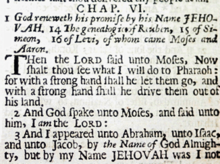 Global Information
Global InformationJehovah information

Jehovah (/dʒɪˈhoʊvə/) is a Latinization of the Hebrew יְהֹוָה Yəhōwā, one vocalization of the Tetragrammaton יהוה (YHWH), the proper name of the God of Israel in the Hebrew Bible/Old Testament.[2][3][4] The Tetragrammaton יהוה is considered one of the seven names of God in Judaism and a form of God's name in Christianity.[5][6][7]
The consensus among scholars is that the historical vocalization of the Tetragrammaton at the time of the redaction of the Torah (6th century BCE) is most likely Yahweh. The historical vocalization was lost because in Second Temple Judaism, during the 3rd to 2nd centuries BCE, the pronunciation of the Tetragrammaton came to be avoided, being substituted with Adonai ('my Lord'). The Hebrew vowel points of Adonai were added to the Tetragrammaton by the Masoretes, and the resulting form was transliterated around the 12th century CE as Yehowah.[8] The derived forms Iehouah and Jehovah first appeared in the 16th century.
The vocalization of the Tetragrammaton Jehovah was first introduced by William Tyndale in his translation of Exodus 6:3, and appears in some other early English translations including the Geneva Bible and the King James Version.[9] The United States Conference of Catholic Bishops states that in order to pronounce the Tetragrammaton "it is necessary to introduce vowels that alter the written and spoken forms of the name (i.e. "Yahweh" or "Jehovah")."[10] Jehovah appears in the Old Testament of some widely used translations including the American Standard Version (1901) and Young's Literal Translation (1862, 1899); the New World Translation (1961, 2013) uses Jehovah in both the Old and New Testaments. Jehovah does not appear in most mainstream English translations, some of which use Yahweh but most continue to use "Lord" or "LORD" to represent the Tetragrammaton.[11][12]
- ^ Exodus 6:3
- ^ Stahl, Michael J. (2021). "The "God of Israel" and the Politics of Divinity in Ancient Israel". The "God of Israel" in History and Tradition. Vetus Testamentum: Supplements. Vol. 187. Leiden; Boston: Brill Publishers. pp. 52–144. doi:10.1163/9789004447721_003. ISBN 978-90-04-44772-1. S2CID 236752143.
- ^ The Imperial Bible-Dictionary, Volume 1, p. 856. "Jehovah, on the other hand, the personality of the Supreme is more distinctly expressed. It is every where a proper name, denoting the personal God and him only; whereas Elohim partakes more of the character of a common noun, denoting usually, indeed, but not necessarily nor uniformly, the Supreme. Elohim may be grammatically defined by the article, or by having a suffix attached to it, or by being in construction with a following noun. The Hebrew may say the Elohim, the true God, in opposition to all false gods; but he never says the Jehovah, for Jehovah is the name of the true God only. He says again and again my God; but never my Jehovah, for when he says my God, he means Jehovah. He speaks of the God of Israel, but never of the Jehovah of Israel, for there is no other Jehovah. He speaks of the living God, but never of the living Jehovah, for he cannot conceive of Jehovah as other than living. It is obvious, therefore, that the name Elohim is the name of more general import, seeing that it admits of definition and limitation in these various ways; whereas Jehovah is the more specific and personal name, altogether incapable of limitation."
- ^ Bromiley, Geoffrey William; Erwin Fahlbusch; Jan Milic Lochman; John Mbiti; Jaroslav Pelikan; Lukas Vischer, eds. (2008-02-15). "Yahweh". The Encyclopedia of Christianity. Vol. 5. Translated by Geoffrey William Bromiley. Wm. B. Eerdmans Publishing / Brill. pp. 823–824. ISBN 978-90-04-14596-2.
- ^ Parke-Taylor, G. H. (1 January 2006). Yahweh: The Divine Name in the Bible. Wilfrid Laurier University Press. p. 4. ISBN 978-0-88920-652-6.
The Old Testament contains various titles and surrogates for God, such as El Shaddai, El Elyon, Haqqadosh (The Holy One), and Adonai. In chapter three, consideration will be given to names ascribed to God in the patriarchal period. Gerhard von Rad reminds us that these names became secondary after the name YHWH had been known to Israel, for "these rudimentary names which derive from old traditions, and from the oldest of them, never had the function of extending the name so as to stand alongside the name Jahweh to serve as fuller forms of address; rather, they were occasionally made use of in place of the name Jahweh." In this respect YHWH stands in contrast to the principal deities of the Babylonians and the Egyptians. "Jahweh had only one name; Marduk had fifty with which his praises as victor over Tiamat were sung in hymns. Similarly, the Egyptian god Re is the god with many names.
- ^ Pfatteicher, Philip H. (1990). Commentary on the Lutheran Book of Worship: Lutheran Liturgy in Its Ecumenical Context. Augsburg Fortress. p. 384. ISBN 978-0-8006-0392-2.
The psalter in its Episcopal and Lutheran forms uses small capital letters to represent the tetragrammaton YHWH, the personal name of the deity: LORD; it uses "Lord" as a translation of Adonai.
- ^ Krasovec, Joze (8 March 2010). The Transformation of Biblical Proper Names. A&C Black. p. 57. ISBN 978-0-567-45224-5.
In the Hebrew Bible, the specific personal name for the God of Israel is given using the four consonants, the "Tetragrammaton," yhwh, which appears 6007 times.
- ^ Schaff, Philip. "Schaff-Herzog Encyclopedia Vol. : 0494=470 – Christian Classics Ethereal Library". www.ccel.org. p. 480. Retrieved 2023-11-04.
- ^ In the 7th paragraph of Introduction to the Old Testament of the New English Bible, Sir Godfrey Driver wrote, "The early translators generally substituted 'Lord' for [YHWH]. [...] The Reformers preferred Jehovah, which first appeared as Iehouah in 1530 A.D., in Tyndale's translation of the Pentateuch (Exodus 6.3), from which it passed into other Protestant Bibles."
- ^ "The Name of God in the Liturgy". United States Conference of Catholic Bishops. 2008.
- ^ Cite error: The named reference
ESVprefacewas invoked but never defined (see the help page). - ^ Cite error: The named reference
NRSVprefacewas invoked but never defined (see the help page).